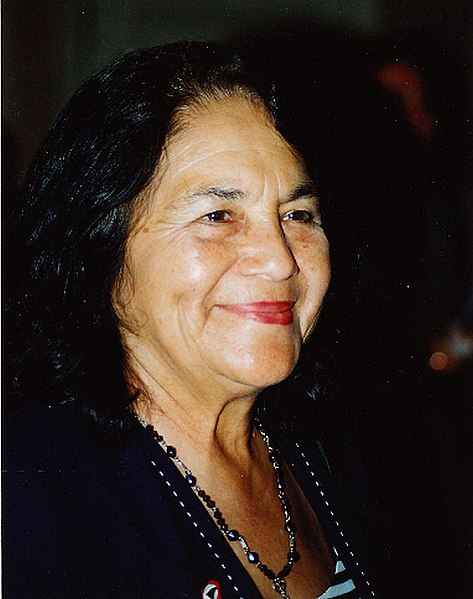
Mural by Yreina Cervánte, Photo by T. Murphy, Wikimedia Commons
Emma Fajardo, Community Engagement Manager at Sky Island Alliance kicked off our celebration of Latino Conservation Week on Monday with a blog post about her experiences as a Latina in conservation. Today we’re highlighting a Latina hero for the environment who is not necessarily associated with environmentalism, and whose name you may not know. I certainly did not learn about her in my environmental policy classes in college.
She is Dolores Huerta, a fierce labor leader, women’s advocate, and civil rights activist. You’ve probably heard of Cesar Chavez – also a labor leader and community organizer – who co-founded the United Farm Workers Labor Union with Dolores. But, Dolores Huerta may be the environmental hero whose name you’ve never heard. And what does the United Farm Workers Union have to do with environmentalism you ask. I’ll tell you!
In the 1960s and 70s the United Farmworkers Union connected worker safety to environmental concerns about unregulated use of pesticides. Detrimental effects of large-scale agriculture on the environment include changes in the hydrologic cycle; introduction of toxic chemicals, nutrients, and pathogens; reduction and alteration of wildlife habitats; and invasive species. And agribusiness was poisoning the predominately Latinx people working agriculture fields at poverty wages, and without basic sanitary resources like water and toilets available to them.
Dolores Huerta spent decades organizing in farming communities in California to win better working conditions and wages for the Latinx farmworkers who were being poisoned and exploited by large corporations. In the fight to protect American farmworkers Huerta exposed the country’s deepening reliance on pesticides and other chemicals that harm people and ecosystems. Her efforts to outlaw harmful pesticides catalyzed the environmental-justice movement. She linked the human cost of our actions to the environmental cost.
To this day at the age of 89, Dolores Huerta is organizing, training and advocating through the Dolores
Huerta Foundation. The Foundation understands the link between healthy environments and healthy people and works to create healthy environments where people can live, work, and play. They train community residents to advocate for parks, adequate public transportation, infrastructure improvements, the reduction of pesticide use, increased recreational opportunities, and culturally relevant services.
Study after study shows that Latinx people have strong pro-environmental attitudes and support policies to reduce climate change and increase environmental protections. According to a Sierra Club study more than 92 percent of Latinx said they “have a moral responsibility to take care of God’s creations on this earth – the wilderness and forests, the oceans, lakes and rivers.” Yet it is harder for Black, brown, and low-income communities to access clean air, water and natural spaces. And the U.S. public continues to underestimate the environmental concerns of nonwhite and low-income Americans. A 2018 study by Cornell University found that most people associate the term “environmentalist” with whites and the well-educated. The predominantly white, mainstream environmental movements have focused on wilderness preservation and government conservation policies.
Well it’s time to broaden our understanding and definitions of environmentalism and to embrace the connections between protecting and respecting vulnerable communities and protecting nature. The same white supremacy, profits-over-people culture that regularly victimizes people of color also wreaks havoc on nature, and it must be transformed.
Dolores believed in the personal power of each individual that when coupled with cooperation and organizing can create the changes needed to improve lives, and in the process, our environment. We can start by lifting up and listening to leaders with diverse perspectives that may be different than ours or that of mainstream environmentalism, but with whom we share important values. I highly recommend learning more about Dolores Huerta’s remarkable work and how she has shaped American history by watching the movie Dolores (2017) that chronicles her life. The film lit a fire in my spirit this week and deepened my understanding of the connections between protecting people and nature. And, we can all gain inspiration and strength from Dolores’ tireless work for justice, and her organizing message ¡Sí, Se Puede!
You can read more in Emma’s blog about her experience as a Latina in conservation here. And more about the amazing partners we work with in Sonora here: Profauna, Naturalia, Unisierra
Resources for Learning, Finding Community, and Taking Action
Latino Conservation Week – https://latinoconservationweek.com/
Hispanic Access Foundation – https://www.hispanicaccess.org/
Latino Outdoors Tucson Chapter – https://www.facebook.com/groups/633214050181615/about

